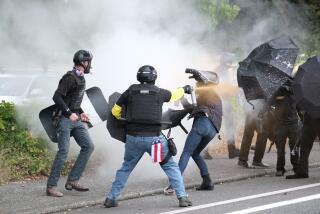Terrorism Case Shows U.S. Moving Proactively
PORTLAND, Ore. — The alleged terrorists headed for Afghanistan at a time when the Taliban were on the run. They left the United States at a time when, authorities say, Al Qaeda’s leadership was eager to have recruits on the ground here.
Money for their alleged scheme came from associates using real names and easily traceable wire transfers--with amounts typically just a few hundred dollars. They took target practice openly at a rural gravel pit, attracting the attention of a deputy sheriff.
The indictment against the six alleged terrorists unveiled here Friday is more suggestive of a group of bumbling, would-be holy warriors than the case’s chilling implication: the nurturing of terrorist soldiers on U.S. soil. “The enemy recruits in this country, it trains in this country, it plans in this country and acts in this country,” Charles Mathews, chief FBI agent in Portland, said in announcing the arrests.
Of course, the court filings only sketch the case against the six U.S. citizens. Officials refused to offer details, and they say much evidence remains secret. Still, federal authorities note that the lack of criminal sophistication apparent in this and other recent terrorism cases does not mean the suspects were not capable of deadly violence--or manipulation by the professional terrorist groups that they allegedly sought out.
“The potential consequences are very serious, especially when you’re talking about international terrorists finding a recruiting ground in our country,” cautioned one FBI official in the Northwest. “What would happen if they had a Mohamed Atta to help them?” the official added, referring to one of the leaders of last year’s terrorist attacks on the World Trade Center and the Pentagon.
Since Sept. 11, 2001, authorities explain that they have adopted a deliberate strategy of preventive arrests--even if the evidence is imperfect--in the hopes of disrupting terrorist plans.
“It’s important for us to be out there preventing attacks,” John McKay, the U.S. attorney in Seattle, said after U.S. native Earnest James Ujaama was charged with aiding Al Qaeda.
The proactive approach provokes concern from civil libertarians and others who question the evidence and wonder whether Muslims are being targeted for unpopular political beliefs.
“While everyone agrees that fighting terrorism must be a top priority at all levels, there is no evidence that any of these U.S. citizens was planning an attack,” said Peter Schey, executive director of the Center for Human Rights and International Law in Los Angeles. “And one has to question the arrests of a handful of alleged sardines while the big fish are apparently swimming away.”
And even veteran prosecutors acknowledge that the task of preventing prospective attacks poses a challenge for a justice system geared toward catching and convicting criminals who have already committed crimes.
“We don’t want to prosecute people for their beliefs or their thoughts, but rather for their actions,” said Robert S. Litt, a former senior Justice Department official in the Clinton administration. “On the other hand, the goals of national security sometimes require that you take action against people before they have a chance to act on their beliefs.”
In the Portland case, there is no public allegation that any of the six suspects planned attacks on the United States or had contacts with known Al Qaeda members. It is not even clear if any of the suspects ever made it into Afghanistan, where five of them allegedly sought to fight on behalf of the Taliban after the Sept. 11 attacks. That alleged desire--and the suspects’ efforts to act on it--is at the core of the case against them.
The four-count indictment, which includes charges of conspiring to “levy war against the United States,” alleges that the suspects attempted to provide support to the Al Qaeda terrorist organization and Afghanistan’s ruling Taliban government. The indictment alleges that as early as the summer of 2001, the six suspects began unspecified physical training with an eye toward traveling to Afghanistan and joining the Taliban jihad.
After last year’s attacks, the indictment alleges that the suspects began weapons training. It charges that four of the men traveled from Portland to a rural gravel pit on private property just across the Columbia River in Washington to practice their shooting skills there.
The next month, the five male defendants began plans to go to Afghanistan, buying airline tickets to Hong Kong with mid-October departures from Portland, the indictment says. One defendant discarded his personal belongings in preparation for the trip, it says.
The indictment places several of them in Hong Kong, mainland China and Bangladesh at various times, and notes that three of the five who left the country returned to the U.S. after apparently failing to gain entry to Afghanistan.
All but one are U.S. natives, including several African American converts to Islam. Several are believed to have worshiped at a mosque here, the Islamic Center of Portland (or Masjed As-Saber), which is close to the apartment complexes where three suspects lived. The mosque’s prayer leader was arrested last month by a federal anti-terrorism task force on charges of Social Security fraud. No terrorism charges have been brought in that case, but prosecutors argued that the imam was a potential threat to the community and should remain jailed.
Worshipers at the large, well-appointed mosque have complained about being targeted, and, after the indictments were released Friday, men there turned away waves of inquiring journalists who approached during prayer hours.
“We are being followed everywhere,” said one obviously distressed worshiper, who declined to give his name.
Another former mosque frequenter, Ali Khaled Steitiye, was sentenced last month to 2 1/2 years in prison for various weapon and fraud charges. But the federal judge refused prosecutors’ requests to impose a harsher penalty because Steitiye, a naturalized U.S. citizen, ideologically supports the militant Middle Eastern group Hamas, which the U.S. government lists as a terrorist organization.
Steitiye figured prominently in last week’s Portland arrests as an “unindicted co-conspirator” who allegedly participated in the target practice session in rural Washington on Sept. 29, 2001. The indictment calls the training episode a warmup for fighting alongside the Taliban. A neighbor complained about the shooting and a sheriff’s deputy responded, later writing a report documenting his suspicions about men in Muslim garb firing a Chinese assault rifle and other weapons less than three weeks after the Sept. 11 attacks. That report eventually helped break the case, authorities say.
The six suspects have varied histories, but apparently shared political kinship opposing U.S. polices in Afghanistan, as well as religious beliefs.
Patrice Lumumba Ford, 31, is a scholar in Mandarin Chinese and the son of a former member of the Black Panther Party, according to reports here. After graduating from Portland State University with a degree in international studies, the Oregonian newspaper reported, he completed a yearlong language program at Johns Hopkins University. He changed his name in honor of the former leader of the Congo, ousted in a plot aided by the CIA. He was also a former intern for Portland Mayor Vera Katz, but in August 2001 he sent messages to the mayor’s staff that were regarded as threatening and were reported to police. Neighbors said he spoke Chinese with his wife, had an 18-month-old son and taught physical education for a time.
Jeffrey Leon Battle, 32, is an ex-Army reservist who struggled to make a living as a security guard and support his young son. The indictment alleges that he joined the Army Reserve “in order to receive training in United States military tactics and weapons which he ultimately intended to use against the United States and in support of [Al Qaeda] and the Taliban.” Military officials, however, say he enlisted in 1999, two years before the Sept. 11 attacks.
He went to basic training in South Carolina in February 2000 and then failed to show at his reserve unit in Oregon later that year. He was administratively discharged in 2002.
Battle’s ex-wife, October Martinique Lewis, also was indicted--one of only two U.S. women known to have been charged in post-Sept. 11 terrorism cases. She allegedly wired money to her ex-husband as he attempted to enter Afghanistan.
Two other brothers--Muhammad Ibrahim Bilal, 22, who was arrested in Michigan, and Ahmed Ibrahim Bilal, 24, who is still at large--were somewhat of an oddity at a suburban mosque here because they spoke fluent Arabic and have family ties to Saudi Arabia.
The eldest suspect is a 36-year-old Jordanian, Habis Abdullah al Saoub, who allegedly left behind a mysterious “martyr’s will” directed to a well-known holy warrior before departing en route to Afghanistan. He also is a fugitive.
Many details about the six suspects’ lives remained obscure Saturday as relatives living in the Portland area hunkered inside their homes, refusing to open their doors to reporters or return telephone messages.
One exception was James Britt, a Eugene attorney, who vociferously denied that Ford, who is his brother, has terrorism links.
“It’s all a political game. It’s all hype. It’s all part of the hysteria,” Britt told Associated Press. “We are going to be with him. We are going to support him every step of the way.”
*
Times staff writers Alan Miller and John Hendren in Washington and researcher Lynne Marshall in Seattle contributed to this report.
More to Read
Sign up for Essential California
The most important California stories and recommendations in your inbox every morning.
You may occasionally receive promotional content from the Los Angeles Times.










